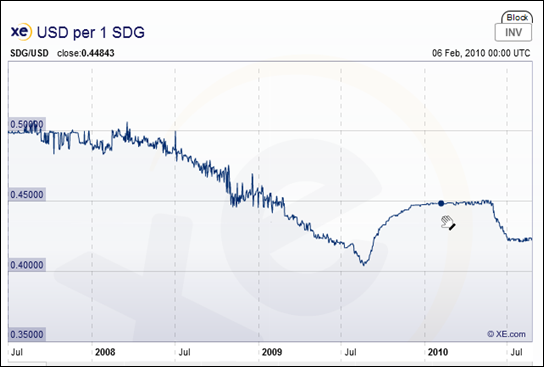The Central Bank of Sudan has stopped sending oil revenues in hard currency to Juba again. Instead, the revenues which GoSS are entitled to are being sent in local currency, causing a major shortage of foreign currency in the South. This is a problem for importers, who now can’t pay for their imports.
The Minister of Finance in the South has publicly stated that “It is an attempt by the National Congress Party to stifle the southern Sudanese economy” (AFP).
Whilst I wouldn’t rule this out completely, it’s probably something altogether less Machiavellian.
The Sudanese Pound began weakening against the US dollar in 2008. This increased the cost of importing goods. At some point the elites in Khartoum got sick of the rising cost of their imported goods.
In July 2009 the Central Bank of Sudan began using its foreign currency reserves to buy Sudanese Pounds – bidding up the value of the Pound, and making imports cheaper again.
You can see this on the chart, where the Bank was clearly targeting an exchange rate of around $0.45 to the Sudanese Pound. Assuming that the Pound would otherwise have continued to weaken, this quickly must have turned into an expensive operation. The Bank would have had to keep on spending all of its foreign reserves on buying up Sudanese Pounds.
Eventually, sometime around May 2010, Khartoum ran out of foreign currency, and let the Pound fall in value a bit.
Chances are then that Khartoum has stopped sending dollars to Juba simply because it has so few left itself that it wants to build up a reserve again. None of this takes away though from the economic damage being inflicted upon the South. Good luck Juba.

1 comment:
re: "simply" - or perhaps it is the constellation of reasons that is important. If you want to weaken the South without looking bad, this is one way to do it, for example. Nice post.
Post a Comment